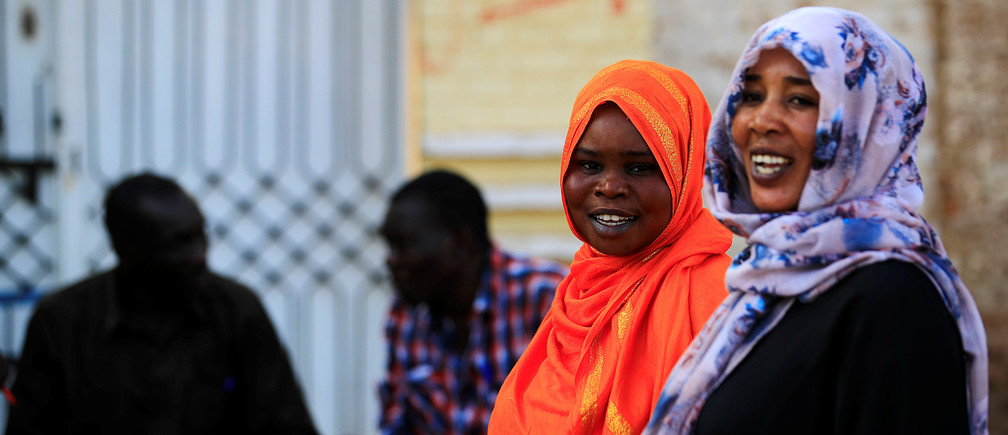Women only hold two of the six civilian positions in Sudan’s 11-member Sovereign Council, which will run the country for three years until elections take place
The iconic image of a young woman in a traditional white robe standing on a car roof with her finger in the air came to symbolise the role of women as vanguards of Sudan’s revolution but many say their calls for equality are already being ignored.
Following the protesters’ ousting of veteran autocrat Omar al-Bashir in April, women only hold two of the six civilian positions in Sudan’s 11-member Sovereign Council, which will run the country for three years until elections take place.
“When we reflect on what has happened since the protests ended, there are some gains for women – but it falls far short of satisfactory,” said Asma Ismail, who took part in the nine-month-long protests in the Sudanese capital, Khartoum.
“There is a sense of frustration as there was an expectation that political parties, civil society, and so forth would prioritise and put the women’s agenda at the forefront, but that did not happen.”
From students and academics to housewives and street traders, women were on the revolution’s frontlines. But the new regime does not share their priorities, such as ending forced marriage and public floggings for wearing trousers.

One in four women are married before 18, while nine out of 10 have undergone female genital mutilation (FGM) in the strict Islamic north African nation, the United Nations (U.N.) says.
Sudan has few laws to protect women and girls. FGM and child marriage are not crimes in the predominantly Muslim nation where Islamic personal status laws allow girls to be married once they hit puberty or, at the age of 10, with a judge’s permission.
Women’s rights campaigners say they have been left out of negotiations, poorly represented in key institutions and only given vague commitments about their rights in the “new” Sudan.
Prime Minister Abdalla Hamdok has appointed only four women to hold portfolios – foreign affairs, youth and sports, higher education and labour and social development – out of 18 posts.
“So many women suffered for their part in the revolution – not just on the streets, but also fighting in their homes to even be a part of the protests,” said Hadia Hasaballa, professor of gender studies at Ahfad University for Women in Omdurman.
“But we believed it was worth it … that our rights would be prioritised in the new government. It is very disappointing that we are being sidelined after the sacrifices we made. Bashir has gone, but that attitude towards women persists.”
WHIPPING
Women’s rights groups also point to Sudan’s “morality laws” which tightly restricted women’s freedom of dress, movement, association, work and study during Bashir’s three-decade rule.
“Under Public Order acts introduced by Bashir’s regime in 1996, police can arrest women and girls for ‘indecent or immoral behaviour or dress’,” said Judy Gitau, a lawyer from the campaign group Equality Now.
“Transgressions such as wearing trousers, leaving hair uncovered, or being in the company a man who is not a family member are punishable by a fine and whipping.”
Up to 40 women are brought daily to the courts in Khartoum for infringements, where they are often tried without a lawyer and sentenced to jail, fined or given public lashings, according to the U.N. special rapporteur on violence against women.
Sparked by hardships like soaring inflation and fuel shortages, many women saw the protests which erupted last December as an opportunity to demand greater freedoms.
Women dressed in headscarves went out onto the streets in their droves – marching and chanting, clapping and singing. Some reports estimate up to 70 per cent of the protestors were women.
The military response was harsh.
The Sudan Doctors’ Committee said it documented 70 cases of rape during a June 3 crackdown and those female students and street vendors reported ongoing harassment, including grabbing and the use of sexist and insulting language across Sudan.
The protests were not in vain. Sudan’s constitutional declaration – a key document which paves the way for civilian rulers to replace the military in three years’ time – promises to guarantee and promote women’s rights during the transition.
It also says that the state will work to combat harmful customs and traditions, ensure equal pay and benefits, provide free healthcare to all mothers and create a Women and Gender Equality Commission, which would repeal all discriminatory laws.
But women’s rights groups say details – such as appointments to the commission and time frames – have not been given.
“I understand change doesn’t happen overnight and we face resistance. But gender justice cannot be ignored and should be at the top of the government’s agenda,” said Huda Shafig of the Women of Sudanese Civic and Political Groups (MANSAM) coalition.
“The same laws that were there under Bashir are still there now. Women continue to face discrimination and harassment even after the protests. So for us, the revolution isn’t over, but continues every day.”

